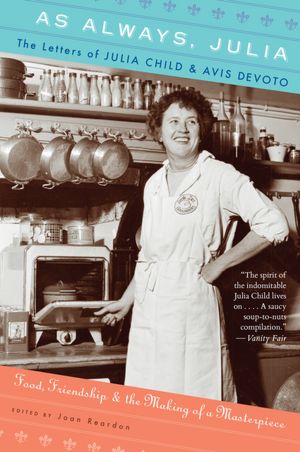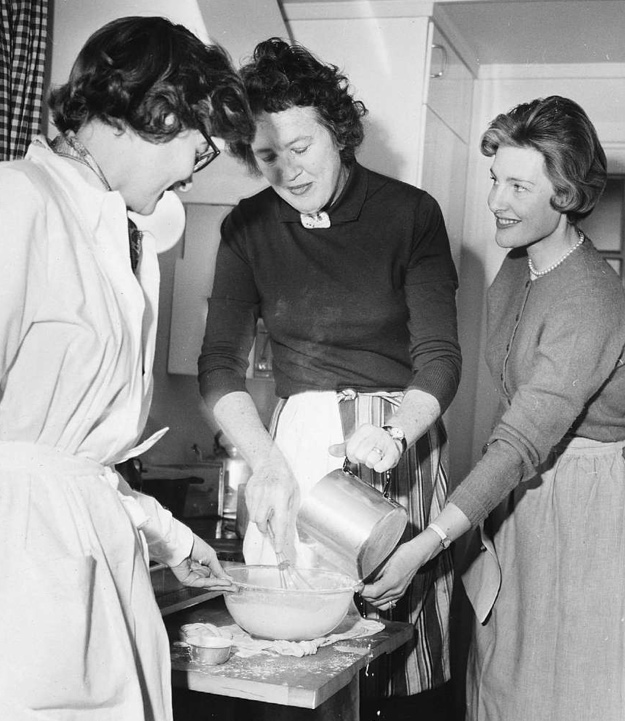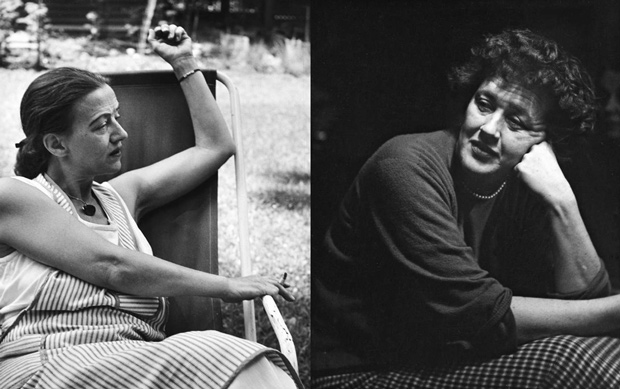“Mastering the Art of French Cooking, Vol I” turns 53 today, and is still going gangbusters
On this day in 1961, Mastering the ARt of French Cooking was published by Knopf (after nine years of work, rejections, etc). It remains in print today. For the full story of the making of that book, read “My Life in France,” which I penned with Julia.
Brain Pickings takes a look back:
A Lesson in Entrepreneurship, Perseverance and Publishing from Iconic Chef Julia Child
by Maria Popova
“Don’t for the love of heaven let anybody rush you into anything.”
 On March 8, 1952, Julia Child, who would have celebrated her 100th birthday today, sat down at her kitchen table in Paris and penned a fan letter to American historian and author Bernard DeVoto, discussing the peculiarities of French and American kitchen knives. But the letter was answered by DeVoto’s wife, Avis, described by one of her husband’s students at Harvard as “very good looking and very sexy-seeming and the only faculty wife who might have said ‘horseshit’ even to [Harvard] President Lowell.” This was the beginning of an epistolary friendship that unfolded into a rich and wide-spanning relationship, exploring the two women’s deepest thoughts and feelings as well as their most passionate professional pursuits and aspirations, as Avis became Julia’s confidant, great champion, and unofficial literary agent.
On March 8, 1952, Julia Child, who would have celebrated her 100th birthday today, sat down at her kitchen table in Paris and penned a fan letter to American historian and author Bernard DeVoto, discussing the peculiarities of French and American kitchen knives. But the letter was answered by DeVoto’s wife, Avis, described by one of her husband’s students at Harvard as “very good looking and very sexy-seeming and the only faculty wife who might have said ‘horseshit’ even to [Harvard] President Lowell.” This was the beginning of an epistolary friendship that unfolded into a rich and wide-spanning relationship, exploring the two women’s deepest thoughts and feelings as well as their most passionate professional pursuits and aspirations, as Avis became Julia’s confidant, great champion, and unofficial literary agent.
As Always, Julia: The Letters of Julia Child and Avis DeVoto (public library) isn’t merely a collection of the 200 letters exchanged over the course of this extraordinary correspondence — it’s a powerful portrait not just of two visionary, worldly women who traveled extensively, read voraciously, and inhabited endlessly stimulating intellectual and social circles, but also of the sociocultural landscape of the 1950s and 1960s, including the evolving role of women and the changing stakes of creative entrepreneurship.
Buried in the correspondence are nuggets of Julia’s visionary culinary sensibility and cultural ethos as they were beginning to take shape. In a letter dated January 5, 1953, Julia writes Avis:
You display the true marks of a Great Gourmande … which always includes the warmest and most generous of natures … and is why people who love to eat are always the best people.
On January 19, 1953, some etiquette advice:
The young hostess should be advised never to say anything about what she serves, in the way of ‘Oh, I don’t know how to cook, and this may be awful,’ or ‘poor little me,’ or ‘this didn’t turn out’… etc. etc. It is so dreadful to have to reassure one’s hostess that everything is delicious, whether or not it is. I make it a rule, no matter what happens, never to say one word, though it kills me. Maybe the cat has fallen in the stew, or I have put the lettuce out the window and it has frozen, or the meat is not quite done … Grit one’s teeth and smile.)
A letter from December 1, 1955, bespeaks Julia’s remarkable work ethic:
Only wrote 16 notes and letters today, with three long calls in the morning and one in the afternoon, so I am exhausted and will go to bed on my electric pad and read a whodunit.
Perhaps most fascinating of all, however, is the absorbing insider’s look at the publishing industry that the correspondence reveals as Julia and Avis navigate the maze of bringing Child’s culinary ideas to the mainstream with the publication of her seminal book, Mastering the Art of French Cooking, which Avis steered first to Houghton Mifflin and eventually to its home at Knopf. It was at last released on October 16, 1961. Filled with romantic idealism about how publishing ought to work, they consistently brush up against barriers to creative freedom and integrity, shedding light on how much has changed and how much has remained the same in the half-century since.

While the Childs were in Oslo, Julia taught cooking classes to small groups of her ‘Wegian’ friends and diplomatic wives.
For more of this post, see:
https://www.brainpickings.org/index.php/2012/08/15/as-always-julia/
